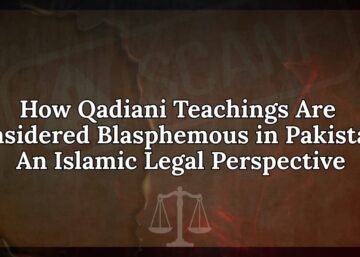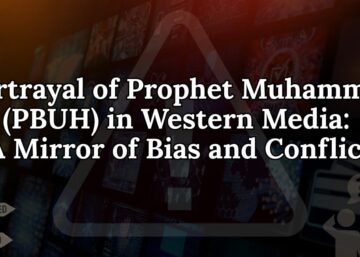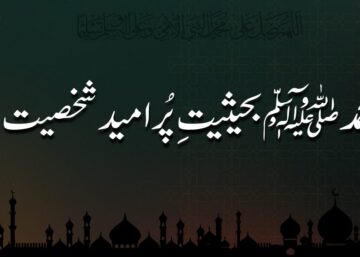At the very heart of Islam lies the belief that Prophet Muhammad (PBUH) is the final messenger of Allah. This principle has been a continued unifying force for the Muslim Ummah for over 1,400 years, irrespective of culture, language, or geography. Yet, few of us consider why this is such a vital element of faith.
What is the implication of other claims? To what extent do such claims affect the unity of the Muslims and the integrity of the Islamic teachings? Such questions are theological challenges and signify a challenge that shakes the foundation of Islam.
In this article, we will dive into the importance of the Finality of Prophethood (PBUH) in Islam and analyze the notorious claims of Mirza Qadiani, the originator of the Ahmadiyya movement.
Allah says in Surah Al-Ahzab, verse 33:40, as follows:
“Muhammad is not the father of any of your men, but he is the Messenger of Allah and the Seal of the Prophets. And Allah has full knowledge of all things.”
Two important points arise from this verse: Firstly, Prophet Muhammad (PBUH) was not the biological father of anyone, which means he is a Prophet for all, highlighting his distinctive position. Secondly, He (PBUH) is the “Seal of the Prophets”, which denotes the conclusive end of Prophethood. For further interpretation, we look into three significant Hadiths that shed light on this verse and its implications.
Evidence from the Hadith
The Story of the Final Brick
The Holy Prophet (PBUH) said:
“My relationship with the other Prophets is like that of a man who built a beautiful house but left one brick missing. People admired the house but wondered why the final brick had not been placed. I am that brick, and with me, Prophethood is complete.”
(Sahih al-Bukhari: 3535)
This comparison demonstrates that the Finality of Prophethood, as a divine edifice, was completed with Prophet Muhammad (PBUH). No space is empty for another “brick” (Prophet) to be added or replaced.
Address during the Farewell Pilgrimage
In his Farewell Pilgrimage (Hajjat-al-Wida), the Prophet Muhammad (PBUH) said:
“O people, know there will be no Prophet after me and no new community after you. Worship your Lord, perform your five daily prayers, fast in Ramadan, give your Zakat, and obey those in authority among you. You will enter the Paradise of your Lord.”
(Reported in Kanz al-Ummal and Musnad Ahmad)
This declaration was made during one of the most significant gatherings of Muslims, leaving no ambiguity about the finality of Prophethood.
Prophet Muhammad’s (PBUH) Last Days
Abdullah ibn Amar reported: The Prophet Muhammad (PBUH) came out to us one day as if to say farewell. The Prophet said, “I am Muhammad, the unlettered Prophet. There is no prophet after me. I have been given words that are eloquent, comprehensive, and decisive. I know how many angels guard the Hellfire and carry the Throne. Leniency came through me, and I was pardoned along with my nation. Thus, listen and obey me as long as I am among you. When I am taken away, you must adhere to the Book of Allah. Make what it declares lawful and forbid what it declares to be forbidden.
(Musnad Aḥmad: 6981)
The Contradictions in the Claims of Mirza Ghulam Ahmad
Envision a man who begins with sincerity, claims piousness, and even curses those falsely claimed Prophethood. Over time, his assertions change, starting as a reformer, then a prophet, and ultimately escalating to the audacity of claiming divinity. Such a journey not only confuses the minds of his followers but also challenges the very fundaments of the Islamic teachings. This paradox lies at the heart of Mirza Ghulam Ahmad’s trajectory, as narrated in his writings. Now, let’s critically look at his claims and their implications.
Initial Denials and Subtle Shifts
When objections arose that Mirza Ghulam Ahmad aspired to Prophethood, he strongly denied it. He stated,
“Let it be clear that I, too, curse claimants of prophethood.”
(Advertisement, Majmu’a-e-Ishtiharat, Vol. 2, pp. 297–298)
At this stage, he positioned himself as a follower of Islam, emphasizing that his revelations were nothing more than divine inspiration granted to devout Muslims. However, as his mental condition deteriorated, often described by his contemporaries as hysteria or melancholia, his claims escalated.
Dr. Mir Muhammad Ismail recounts:
“I heard the Promised Messiah (Mirza Ghulam Ahmad) say many times that he suffered from hysteria and often had melancholia.”
(Seerat-ul-Mahdi, Part 2, p. 55)
The Review of Religions further highlights the theological challenge posed by such ailments:
“If it is proven that a claimant of divine inspiration suffered from hysteria, melancholia, or epilepsy, his claims are automatically nullified.”
(Review of Religions, August 1926, pp. 6–7)
Progression of Claims
From denying Prophethood outright, Mirza began introducing subtle nuances:
Reformer
“I do not claim Prophethood. Claiming divine inspiration does not necessarily make one a prophet.”
(Jang-e-Muqaddas, Ruhani Khaza’in, Vol. 6, p. 156)
Partial Prophethood
“The term’ prophet’ used about me is metaphorical, not literal.”
(Siraj Munir, Ruhani Khaza’in, Vol. 12, p. 5)
Final Claim to Prophethood
“The true God is the one who sent His messenger to Qadian.”
(Rafa-ul-Bala, Ruhani Khaza’in, Vol. 18, p. 231)
From Prophethood to Divinity
Shockingly, his claims did not stop at Prophethood. He wrote:
“In one vision, I saw myself as God. I believed that I was the one who created the heavens and the earth.”
(Kitab-ul-Bariyya, Ruhani Khaza’in, Vol. 13, pp. 103–105)
This progression from reformer to Prophet to claimant of divinity raises fundamental questions about the consistency and authenticity of his claims.
Theological Concerns
This progression raises serious questions:
- If Prophethood ended with Muhammad (PBUH), how can anyone claim to be a Prophet without refuting Islamic teachings?
- How can somebody guided by divine incentive make conflicting claims about their role?
- Does this not support the Prophet Muhammad’s (PBUH) warning against the false prophets who will deceive people?
The Effect on Faith
Accepting the Mirza Qadiani’s claims destabilizes the faith in the Finality of Prophethood, which is a vital pillar of Islam. Furthermore, such beliefs divert attention from the Quran and Sunnah, which are the ultimate foundations of guidance. They bring confusion and sectarianism among Muslims, which is exactly what the Prophet Muhammad (PBUH) warned against.
A Call to Reflect
As Muslims, we must carry the honor of Islam forward. The Quran and Hadith provide no room for argument on this point. Prophet Muhammad (PBUH) is the last of the messengers, and his message is complete. Any effort to meddle with this truth only takes us from righteousness.
Let the shifting claims of Mirza Ghulam Ahmad remind us to be watchful. We are not the followers of some deceptive leader; we are followers of an unchanged message which Allah and His Prophet (PBUH) taught us.
Therefore, the questions arise:
Can we compromise on some sanctified beliefs over such false claims?
Should we follow somebody whose assertions go against the Quran and Sunnah?
Or should we hold firmly the truth that Prophet Muhammad (PBUH) is the Seal of the Prophets?
The decision lies with us. And in choosing wisely, we protect not only our faith but also the unity and strength of the Muslim Ummah.
Conclusion: Time to Reflect and Return
My dear Ahmadi friends, let us take a moment and reflect on the question. Why is it that you are sacrificing your family ties, your dignity, and your hard-earned wealth for a man whose claim itself does not even tally with his writings? Why is loyalty toward one family, living in unparalleled luxury, more important than loyalty towards Allah and His Messenger (PBUH)?
Consider the life of Mirza Ghulam Ahmad from his books. Do his actions, personal life, or conflicting proclamations mirror a true Prophet’s dignity and character? A Prophet is a role model, a shining example of purity, wisdom, and truth. With your heart and mind, can you genuinely say that Mirza Ghulam Ahmad fits that description? Look around you. The promises of endless growth and massive conversions are nothing more than propaganda. Each of you is told, “It’s happening somewhere else,” but has anyone ever seen this supposed wave of new believers? Instead, you know an organization built on your sacrifices, benefiting a select few while leaving you empty dreams and broken ties.
The Quran and the teachings of Prophet Muhammad (PBUH) are clear: Prophethood has ended. No new Prophet will come, and no new message will be revealed. Islam is complete, perfect, and eternal. Why should we accept claims that directly contradict this fundamental truth? Dear friends, this is not about one person or one community but about your faith, future, and connectivity with Allah. Break free from the shackles of deception and propaganda. Return to the original teachings of Islam, and you’ll find peace, unity, and purpose. Remember, the truth is not found in unquestioning loyalty but in sincere reflection and the courage to follow the path of righteousness. It’s never too late to choose truth over illusion and faith over falsehood. The door to Allah’s mercy is always open. Walk through it before it’s too late.



